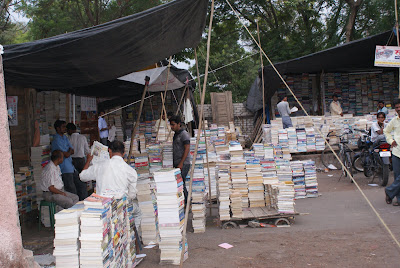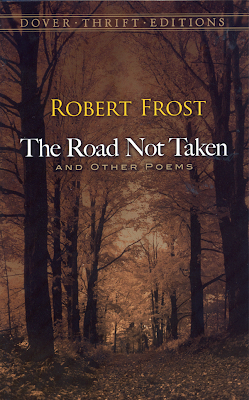
The first time I heard about Kafka was in a interview of
Kabir Bedi in a Times of India Sunday supplement called Times Life.
Kabir told the scribe that one of his former wife quoted Kafka a lot. So, then as you know Google is your friend, I googled Kafka. And I was introduced to one of the authors who is enigmatic and mysterious, with shades of surrealism in in. But it was not until very recently that I bought the works of Kafka, in hard copy. I had them in soft version, tried to read them on screen, but without success. It was not until Strand Book Fair 2009 that I had mint copies of Kafka's work with me. Apart from
The Trial, now I have almost all of his major works. I started with
The Sons, which is a collection of three stories, namely,
The Judgement, The Stoker and finally
The Metamorphosis.

Kafka wanted to publish these three stories in one volume, he said in a letter to his editor there is a secret strand which runs through these three. The novels I think are a window to Kafka's mindset. The stories reveal a complex personality of Kafka, which was tried to carve an existence of its own in the shadow of the overpowering personality of his father. The feelings of Kafka are made clear in the part of the compilation,
A Letter To His Father, where he tries to convey his father, tries to convey him, how strong and suffocating his
personality was for Franz as a child and also as an adult. It relates small incidents, which made a dent on Franz's egg shelled mind, whose repercussions he felt even as an adult.
Some of the incidents in one's childhood can have a lasting influence on one's future. This I guess, most of us can relate to. How many childhood memories, especially non-pleasant ones, are still fresh in your mind, as if, they happened just yesterday? On the other hand the joyful ones, many times, are harder to remember. This where I guess Kafka is just great, he remembers little episodes from his childhood, and relates them to the person he is now. As far as qualities were concerned Franz was a direct opposite of his father. And he makes a point how his forced silence in the childhood made him the person he was. I think this is where Kafka gets his inspiration from. The things which he was not allowed to say, came out in form of the literature that he has produced. This is why I say, that his literature is a window into his complex and sometimes surrealistic persona.
My reading of Kafka is also confirmed by others. In the Fontana dictionary of Modern Thinkers [1], it says,
Himself slim, sensitive, an intellectual, Kafka was dominated by his well built, bullet headed, businesslike father, about whom, he said, all his works were written.
The picture above appears on the front cover of the same book [1].
And in Franz's own words
My writing was all about you; all I did there, after all, was to bemoan what I could not bemoan upon your breast.
Now to the three stories themselves:
The JudgementIn this story an obedient son commits suicide
The StokerIn
The Stoker Kafka
You can think whatever you like. But morals change every time you go to a new port.
Oh, that's just the way things are; it doesn't always depends on whether a man likes it or not.
I am complaining just for the sake of complaining.
You don't listen to what I say, and then you give me advice.
Activity without end, restlessness transmitted from restless element to helpless human beings and their works!
All his strength was concentrated in his fists, including the very strength that held him upright.
And all other people here are of no consequence.
The MetamorphosisThis getting up early, he thought, can make an idiot out of anyone.
... since he was well aware his mediations, would come to no sensible conclusion if he remained in bed.
But what's the use of lying idle in bed?
... if that were possible, and saw no way of bringing any calm and order into this senseless confusion, he told himself again that it was impossible to stay in bed and most sensible course was to risk everything for the smallest hope of getting away from it.
.. he did not forget to remind himself occasionally that cool reflection, the coolest possible, was much better than desperate resolves.
Inspite of his predicament he could not suppress a smile at the very idea of it.
I'm in great difficulties, but I'll get out of them again.
Don't make things any worse for me than they already are.
Letter to His Father
Nothin alive can be calculated.
The effect you had on me was the effect you could not help having.
I couldn't pick and choose, I had to take everything.
You mistake the person for the thing.
But that joke is, in a sense no joke at all.
Between us there was no real struggle; I was so finished off; what remained was flight, embitterment, melancholy and inner struggle.
All this, however, is today only a dream.
Even in other circumstances I should probably have become a shy and nervous person, but it is a long dark road from there to where I have come.
It is not easy to find a middle way.
My writing was all about you; all I did there, after all, was to bemoan what I could not bemoan upon your breast.
Probably I am constitutionally not lazy at all, but there was nothing for me to do.
To live with such fantasies is not easy for a child.
In reality, however, the marriage plans turned out to be most grandiose and hopeful attempts at escape, and, consequently their failure was correspondingly grandiose.
That so many seem to succeed in this is no evidence to the contrary; first of all, there are not many who succeed, and second these not usually don't ``do" it, it merely happens to them; although this is not that
utmost, it is still very great and very honorable.
There were certainly obstacles, as there always are, but then, life consists of confronting such obstacles.
... but they are not decisive; they do, like worms, complete the works on corpse but the decisive blow has come from elsewhere.
It is too much; so much cannot be achieved.
But if he escapes, he cannot rebuild and if he rebuilds he cannot escape.
In my hand I have nothing, in the bush everything.
But I did not ask this question but live it from it from childhood on.
Everything is entered but never balanced.
But you sit at your window when the evening falls and dream it to yourself.
A way of life so natural that is borders on existence.
Just think of how many thoughts a blanket smothers, and how many unhappy dreams it keeps warm.
Do you think I have no memories?
rooted in ordinary life, he experienced or imagined ordinary fear,
distress, frustration, to an extent that we can all empathize with
because it corresponds, if not to our actual experience, then to our
apprehensions, even our nightmares.
Metamorphosis
[0] Franz Kafka,
The Sons. Schocken Books, 2000, 0805208860
[1] The Fontana Biographical Companion to Modern Thought: Alan Bullock, R B Woodings (Eds.), Fontana, 1983, 0006369650
[2]








 But apart from this there are a few other sellers which I want to tell you about. They are Mr. Prabhakar and Co. Major chunk of my own collection comes from them. These booksellers do not have a permanent shop as such but are basically street vendors. They sit at the Deccan end of the Sambhaji
But apart from this there are a few other sellers which I want to tell you about. They are Mr. Prabhakar and Co. Major chunk of my own collection comes from them. These booksellers do not have a permanent shop as such but are basically street vendors. They sit at the Deccan end of the Sambhaji  Mr. Prabhakar with his road side stall, at Deccan End of Sambhaji Bridge.
Mr. Prabhakar with his road side stall, at Deccan End of Sambhaji Bridge.






















